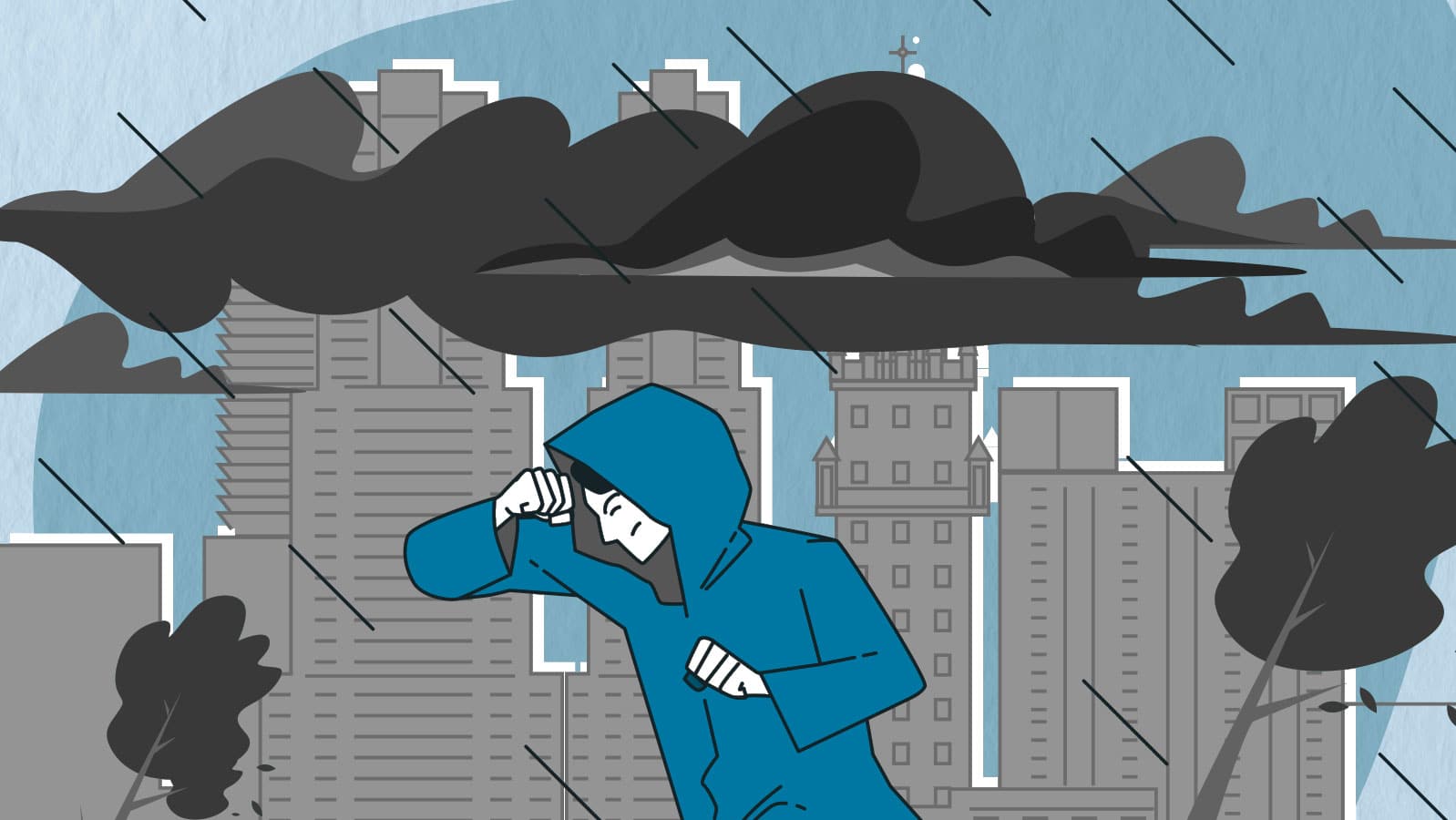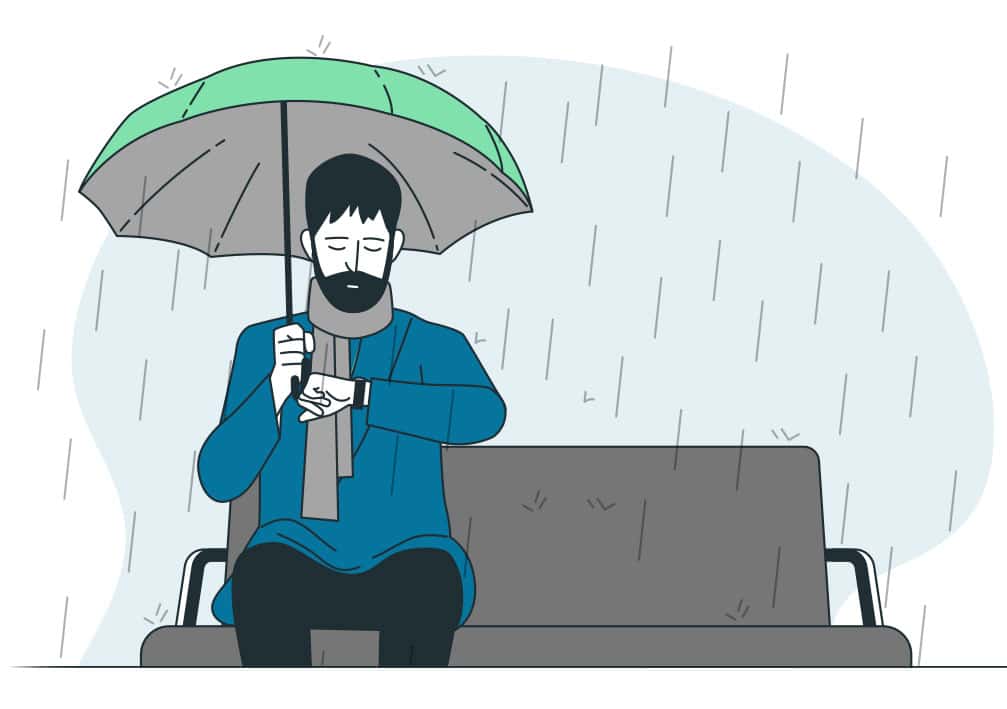RESOURCES ⇢ B2G
Will You Survive This New Admin?
5 Ways to Protect Core Contracts
Will You Survive The DOGE Storm? 5 Ways to Protect Contracts
While everyone else “lays low” and avoids addressing this challenge, the real winners in this storm are using the time to be more proactive. Here’s how:

You’re most likely here because you feel the pressure mounting. That sense of uncertainty isn’t just stress, it’s a clear warning sign for the need to take action.
Many in government contracting are currently sitting back and “laying low,” waiting for further communication. But to survive this storm, you must be more proactive in your approach.
This perfect storm is reshaping everything:
- Contract consolidations
- Increased scrutiny
- Budget uncertainty and continuing resolutions
- Economic recession warnings
- Heightened competition
- Customer upheaval from sweeping personnel changes
This isn’t just a market correction. It’s a fundamental reshaping of the competitive landscape and a huge challenge for leadership.
The hard truth? Many organizations won’t survive this transition, and those that do will likely emerge looking significantly different. Your ability to adapt and anticipate disruption will determine whether your organization thrives or becomes another casualty.
We’ve received a significant number of calls from GovCon leaders in the last year. Below we’ll cover 5 ways they’ve pivoted this year to anticipate market changes.
Have you made any of these changes with your team yet?
1. more than one contact is not optional
Your primary client contact announces their retirement, and you realize your team hasn’t executed the account penetration strategy, leaving you with no intel source on a “must-win” opportunity.

Remember when one good contact was enough? Those days are long gone.
This disruption has made this once occasional risk to a prominent risk on many contracts.
insighT:
If your team’s contract or entrypoint relies on a single individual, you’re one resignation or layoff away from losing everything in this environment.
ASK YOURSELF:
- Are we well-positioned with other stakeholders to avoid a setback if our top contact were to leave tomorrow?
- Have you built connections with all stakeholders? Users, technical evaluators, contracting officers, and program managers?
- Can your team rebuild relationships quickly if your key contacts change?
Forward-thinking companies are currently developing account maps and establishing strong customer stakeholder networks, ensuring resilience even when key individuals leave.
The risk of a single point of failure in a customer is more risk than they are willing to accept.
To be sure, your contacts may have just as much information as your team does at this point, but even reaching out with empathy to stay in touch and make broader connections will put your team top-of-mind more than just sitting back in a waiting game.
Is your team currently working to build relationships in this storm?
2. intel is your most valuable commodity
This is a costly mistake we hear time and time again from leaders.
During a project meeting, your customer openly shares their frustrations about critical mission gaps. Your program manager nods politely and quickly changes the subject to the first item on their agenda. This happens again and again in organizations we’ve analyzed.
As recessionary fear surfaces, BD and Marketing are often the first focus to cut overhead. This leaves your pipeline at the mercy of team members whose primary responsibility isn’t growth.
Winning happens one engagement at a time. Every engagement is an opportunity to gather intel, and your delivery team will have hundreds, if not thousands of meetings with the customer.

What your delivery team doesn’t yet know is every interaction they have with customers holds critical intelligence—but only if they know how to recognize it.
Most contractors ignore this gold mine, allowing vital intelligence to slip away.
ASK YOURSELF:
- Is your delivery team trained to spot and develop opportunities while doing their day jobs?
- Is your entire team trained to understand and capture customer intelligence?
- Do they understand that gathering and sharing intelligence is everyone’s responsibility?
- How many opportunities (new and on-contract growth) are left on the table because no one’s paying attention?
Forward-thinking organizations are currently training their technical and delivery roles to proactively gather and share valuable customer insights.
These roles must understand why and how to integrate intelligence gathering into everyday responsibilities. Growth is a team effort, and with the right training and revenue incentives, leaders can see an increase in intelligence and revenue as teams rally around a growth mindset.
insighT:
Often, delivery and operational roles can provide more growth opportunities than traditional growth-focused roles with the right training and revenue incentives.
That’s why we call often call them “double threats,” as they can combine their technical abilities with improved intel gathering skills to quickly build trust across the account and provide more personalized solutions than competitors.
3. early engagement is key to winning
While you wait for an RFP to drop, your competitors are hard at work understanding the customer needs, submitting white papers, and shaping the solicitation to their strengths.
Here’s the truth many often ignore: When most significant RFPs drop, the winners and losers have already been decided.
Not engaging early in a turbulent environment or reaching out to stay top-of-mid often means you’ve already lost the next opportunity.
Organizations are 80% more likely to win if their teams excel at customer engagement¹ and strong engagement strategies can increase their annual revenue by up to 23%².
¹ Deltek Federal Procurement Success | ² Aberdeen Group
Forward-thinking organizations are engaging customers early, right now in fact, to proactively understand challenges and influencing priorities. They’re actively working to position themselves as trusted partners long before an RFP is released.
We recently talked to leadership from an established organization who lost to a smaller business, despite the fact they outspent them by large margins to win the opportunity.
Why they lost: Their team didn’t realize until later the smaller firm had been working with the customer on a solution for 18 months before the RFP dropped.
ASK YOURSELF:
- Are you starting early enough to shape requirements or just respond to them?
- When was the last time you helped a customer solve a problem proactively?
4. proposals full of ai & assumptions lose
The last proposal you lost likely wasn’t because of your price or capabilities.
More likely, your competitor prioritized relationships and intel gathering, making their proposal focused on real customer intelligence while yours was filled with assumptions.
Your team’s lack of customer intelligence isn’t just a disadvantage; it’s the reason you’re losing. Contractors pour millions into proposals but overlook the need for early and accurate intelligence.

We’ve seen companies spend millions on proposals that missed the mark because they relied on assumptions rather than actual customer intelligence.
Although AI can provide some value in certain contexts, it simply doesn’t hold a candle to the type of intelligence you get first-hand. Many teams are over relying on AI-generated content as a quick fix to their underlying problem, with similar results.
insighT:
Would you want to read through a proposal full of AI-generated text and assumptions for your business? And would you believe that business truly cared about your needs and would be the partner you need by your side for the future?
Winning companies understood clearly what the customers wanted. No assumptions needed.
ASK YOURSELF:
- When was the last time your team successfully shaped an RFP?
- Are you submitting generic proposals filled with fluff instead of addressing unstated needs?
- Does your team uncover intelligence your competitors don’t have, or are you competing proposals blindly with “purchased” intel?
5. Complacent teams kill recompetes
We receive calls about this every month, yet warnings often fall on deaf ears.
The scenario: A “guaranteed” recompete is unexpectedly lost to a competitor who offers a more compelling solution. With fewer new opportunities, winning your recompetes is no longer optional. It’s a matter of survival.
Your competitors are inside the agencies today, influencing how your recompetes will look tomorrow.
ASK YOURSELF:
- If your staff is reduced, does your remaining team possess the skills to secure recompetes?
- Do you know what your customers think of your performance?
- Are you continuously improving your approach to address evolving customer needs?
- Are you prepared for hungry competitors to bid at or below cost to win your work?
Forward-thinking organizations ensure their teams understand customer priorities, regularly introduce innovations, and proactively demonstrate ongoing value.
A complacent incumbent is a vulnerable incumbent.
leadership takeawayS: 5 steps to take now
1. Don’t Risk Single Points of Failure
- Have your team map out all stakeholders on your key contracts today. If any accounts rely on one or two contacts, they are at risk and should be prioritized.
- When your team is out of sight, they are also out of mind. Intel might be slim, but you should still make sure your team is actively reaching out to your contacts now with empathy, asking how they are doing and how these changes are affecting them.
- If your team hasn’t been trained on how to build relationships, this momentary break is the perfect time to give them the skills and confidence to improve them.
2. Make Intel Gathering Everyone’s Job
- Make sure your team understands growth is everyone’s job. They should be listening for intel and sharing it internally as part of their role. Your team needs to understand sharing customer needs is not “sales.” It’s what partners do for their customers.
- If you don’t currently have revenue incentives for delivery and operational roles, this is a great time to set those up to drive behavior change. Also make plans to feature success stories of delivery roles bringing home critical intel that resulted in a win.
- For prioritized accounts and upcoming recompetes, pull cross-functional teams together to strategize on missing intel gaps and stakeholders.
- If your team hasn’t been trained on how to gather and collaborate on intel, now is the perfect time to get them up to speed with our on-demand program.
3. Don’t Wait. Engage Now and Often
- Direct your team to start outreach now. Submitting white papers or free advice on challenges or updates on innovations could influence solicitations, but simply reaching out to check-in is also valuable and keeps your team top of mind. Ask your team when is the last time they helped a customer without a bid on the table.
- You can track competitors through public data on recent DOGE terminations (e.g., USAID deals) to see where gaps open up for your firm.
- If you’re not currently measuring and monitoring relationship scores on your key accounts, now is a great time to start to identify risks and opportunities.
4. Audit Your Proposals. Are You Wasting Resources?
- Audit your losing proposals. Where they filled with generic AI-driven “insights” and assumptions from your team? Do they read like an organization that cares and is positioned to be the long-term partner they need? Or simply a cut-and-paste exercise?
- When reviewing proposals, note if any opportunities should have been disqualified from the beginning. Make notes of trends you find to share with the broader team.
- Your proposal team can only do so much. It’s up to your BD and delivery team to provide the insights and discriminators for winning proposals. Connect with your proposal team to understand the common gaps and train your team on questioning skills needed to find the right intel and share it with the team.
5. Maintain and Extend Core Contracts
- Reach out to customers now. Make sure you’re crystal clear on what they think of your team’s performance and what could be improved. If you’re not tracking Customer Relationship Scores (CRS), it’s a great time to measure relationships on key contracts.
- Review your top contracts. Has your team improved their approach to address their evolving needs? Or has it just been “business as usual?” If they are simply executing, you’re risking your business to prepared, hungry competitors.
- If your staff is reduced, it’s critical your remaining team have the skills to secure your recompetes. Our streamlined, on-demand program allows busy team members to gain key skills in the little extra time they have during this unique period.
Many teams are playing the “waiting game” to see what happens next…

But organizations taking decisive steps will emerge stronger when the storm passes.
The rest may not survive.
The only question remaining: Are you preparing to win, or are you preparing to be forgotten?

[This training] will create a team enabled to build deep embedded partnerships that provide the business long term, sustainable and desirable results across the organization.
WHY IT matters
The winners in this new landscape won’t be the biggest or the most established.
They’ll be companies that transformed their customer-facing roles into a growth engine before their competitors realized it was necessary.
Have you trained your team to understand why and how to gather intel and build strong, federal relationships? Or are you holding on to an outdated playbook that’s obsolete?
ASK YOURSELF:
Will you use this time to wait or position your team for success?

I can easily see a 10x return on this course [for my team] in the next 18 months.
TAKE ACTION:
You’ve seen the missed opportunities and gaps in customer understanding.
Now, it’s time to get serious and start tracking and improving your federal relationships.
Schedule a confidential 30-minute consultation with our growth specialist to explore how Hi-Q Group can position your BD, Capture and Delivery Team into growth advocates.
learn more:
FREQUENTLY ASKED QUESTIONS
Will DOGE Lead to Cancellations or Renegotiations of My Existing Federal Contracts?
Yes, the Department of Government Efficiency (DOGE) is likely to lead to cancellations, terminations, or renegotiations of existing federal contracts, as its mandate focuses on cutting waste, fraud, and abuse through aggressive cost savings measures and scrutiny of federal obligations.
DOGE has already initiated contract cancellations and contract terminations for what it deems wasteful contracts, with reports of over 380 tracked opportunities affected by March 2025, including prime contracts in various sectors.
This includes potential contract modifications for downsizing or renegotiation to achieve regulatory savings and align with reduced budget priorities.
Hi-Q Group advises monitoring contract IDs in federal spending records like FPDS or USAspending.gov for lags in contract cancellations, as DOGE’s efficiency drive targets wasteful contracts across federal agencies, potentially impacting your contracts if deemed non-essential.
While not all federal contracts face immediate risk, those with high costs or redundancy are vulnerable, leading to contract terminations or renegotiations for cost savings. For contractors, this means preparing for potential disruptions in federal contracting workflows.
How Can I Protect My Contracts in This DOGE Environment?
To protect your contracts in the DOGE environment, Hi-Q Group recommends a proactive strategy focused on demonstrating value, building relationships, and gathering intelligence to survive the “GovCon perfect storm” of consolidations and scrutiny.
Start by avoiding reliance on single contacts; instead, map and engage all stakeholders early to influence priorities and solidify long-term partnerships before RFPs, mitigating risks of contract cancellations or contract terminations.
Train your team to gather and develop intelligence during every interaction, turning employees into a growth engine and ensuring proposals are based on validated intel rather than assumptions, which helps counter DOGE’s focus on waste, fraud, and abuse.
Engage customers proactively to shape requirements and introduce innovations, as winners are often decided pre-RFP, reducing vulnerability to contract modifications or cancellations.
Hi-Q Group’s Essentials and Masterclass programs equip teams with these skills, emphasizing relationship development and intel validation to enhance contract performance and align with DOGE’s efficiency goals.
Additionally, diversify your portfolio beyond high-risk contracts, monitor federal spending records for changes in federal obligations, and document strong contract performance to justify retention during reviews. For contractors, focusing on cost savings demonstrations and compliance can prevent workforce reductions or grant cancellations, while leveraging tools like USAspending.gov for contract IDs helps track agency trends.
How Is DOGE Changing Federal Procurement Processes and Compliance Requirements?
DOGE is changing federal procurement processes by emphasizing efficiency through contract consolidations, stricter oversight, and accelerated reviews to eliminate waste, fraud, and abuse, leading to faster contract awards but increased scrutiny on federal obligations.
Procurement now prioritizes cost savings via renegotiations and terminations of underperforming contracts, with agencies encouraged to shift toward innovative, low-cost bids.
Compliance requirements are tightening, with enhanced audits for regulatory savings and mandatory reporting on waste, fraud, and abuse to align with DOGE’s mandate across federal agencies. This impacts government efficiency commission goals, potentially streamlining contract awards but raising bars for contractor documentation and performance metrics.
For federal agencies, changes include prioritized digital tools for transparency, affecting prime contracts and subawards. Overall, DOGE’s reforms aim to reduce the federal government’s budget bloat, but they introduce uncertainty for contractors in compliance-heavy sectors.
How Will DOGE Affect Small Businesses and Minority Set-Aside Programs?
DOGE will affect small businesses and minority set-aside programs by increasing competition and potential contract cancellations, with small firms holding 60% of terminated contracts and facing multi-billion losses, as per reports from ASBCC and Brookings.
While set-asides like 8(a) or HUBZone aim to protect them, DOGE’s cost savings focus may consolidate contracts to larger players, reducing opportunities in prime contracts and straining budget allocations. Minority programs could see scrutiny for efficiency, but DOGE encourages more small business bids through simplified procurement policy.
Positive aspects include new contract awards in innovation areas, but workforce reductions and grant cancellations pose risks for resource-limited firms. Overall, small businesses may need to demonstrate regulatory savings value to thrive in this Federal contracting shift.
What Opportunities Does DOGE Create for Contractors in Efficiency and Innovation?
DOGE creates opportunities for contractors in efficiency and innovation by prioritizing cost savings initiatives like IT modernization and process streamlining, opening new contract awards in tech and consulting.
This focus on eliminating waste, fraud, and abuse encourages bids for tools that enhance operational transparency, such as AI for audits or digital platforms, aligning with government efficiency commission goals.
Contractors can capitalize on regulatory savings by offering solutions for workforce reductions or consolidated contracts, particularly in high-impact areas like cybersecurity.
This shift in the federal government landscape fosters innovation in cost-effective services, with potential for long-term partnerships if contractors demonstrate measurable business impact. For example, efficiency-focused prime contracts could expand for firms reducing agency budget waste.








